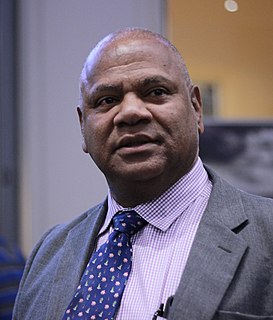
Sir Edward Burnett Tylor was an English anthropologist, the founder of cultural anthropology.
The position of Provincial Secretary was particularly important in Manitoba from 1870 to 1874, as that province's institutions were being established. The province had no Premier during this period, and its Lieutenant-Governor acted as the de facto leaders of government. The early Provincial Secretaries were the most prominent elected officials in the province, and are retrospectively regarded as Premiers in many modern sources.

Scholars have identified more than 1,500 African American officeholders who served during the Reconstruction Era (1865–1877) after passage of the Reconstruction Acts in 1867 and 1868 as well as in the years after Reconstruction before white supremacy, disenfranchisement, and the Democrat Party fully reasserted control in Southern states. Historian Canter Brown, Jr. noted that in some states, such as Florida, the highest number of African Americans were elected or appointed to offices after 1877 and the end of Reconstruction. The following is a partial list some of the most notable of the officeholders pre–1900.

The Third Canadian Ministry was the second cabinet chaired by Prime Minister Sir John A. Macdonald. It governed Canada from 17 October 1878 to 6 June 1891, including the 4th, 5th, and 6th Canadian Parliaments, as well as the first three months of the 7th. The government was formed by the Liberal-Conservative Party in coalition with the old Conservative Party of Canada. Macdonald was also Prime Minister in the First Canadian Ministry.

The Early Birds of Aviation is an organization devoted to the history of early pilots. The organization was started in 1928 and accepted a membership of 598 pioneering aviators.

The Mayor of Cape Town is the head of the local government of Cape Town, South Africa; currently that government takes the form of the City of Cape Town Metropolitan Municipality. In the past, the position of Mayor has varied between that of an executive mayor actively governing the city and that of a figurehead mayor with a mostly ceremonial role.
This article is about the particular significance of the decade 1880–1889 to Wales and its people.

The Livingston family of New York is a prominent family that migrated from Scotland to the Dutch Republic, and then to the Province of New York in the 17th century. Descended from the 4th Lord Livingston, its members included signers of the United States Declaration of Independence and the United States Constitution. Several members were Lords of Livingston Manor and Clermont Manor, located along the Hudson River in 18th-century eastern New York.
This is a list of High Sheriffs of Brecknockshire or Breconshire.
Lincoln was a parliamentary electorate in the Canterbury region of New Zealand from 1881 to 1890. It was represented by two Members of Parliament.
Primitive communism is a way of describing the gift economies of hunter-gatherers throughout history, where resources and property hunted and gathered are shared with all members of a group, in accordance with individual needs. In political sociology and anthropology, it is also a concept often credited to Karl Marx and Friedrich Engels for originating, who wrote that hunter-gatherer societies were traditionally based on egalitarian social relations and common ownership. A primary inspiration for both Marx and Engels were Lewis Henry Morgan's descriptions of "communism in living" as practised by the Iroquois Nation of North America. In Marx's model of socioeconomic structures, societies with primitive communism had no hierarchical social class structures or capital accumulation.
The Hamiltons of the United States are a family of Scottish origin, whose most prominent member was Alexander Hamilton (1755/57–1804), one of the Founding Fathers of the United States. Their ancestors and relations in Scotland included the Lairds of Kerelaw Castle in Stevenston, North Ayrshire, of the Cambuskeith branch of Clan Hamilton.